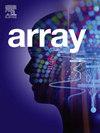Emotion recognition with a Randomized CNN-multihead-attention hybrid model optimized by evolutionary intelligence algorithm
IF 2.3
Q2 COMPUTER SCIENCE, THEORY & METHODS
引用次数: 0
Abstract
Emotion recognition systems are vital for various applications, yet existing models often face limitations in computational efficiency and accuracy, especially when handling complex emotional expressions in sequential data. To address these challenges, we propose an innovative emotion recognition framework that integrates a Randomised Convolutional Neural Network (RCNN) with a Multi-Head Attention model, further optimized by the Football Team Training Algorithm (FTTA) metaheuristic to enhance network parameters effectively. The RCNN, characterized by fixed random weights in its convolutional layers, efficiently extracts features from facial landmarks, enabling robust and diverse feature extraction while reducing computational load. This structure is complemented by a multi-head attention mechanism that processes temporal dynamics in emotion data, with both components optimized through FTTA to balance exploration and exploitation. Our hybrid model undergoes rigorous testing on a widely recognized emotion recognition dataset, outperforming conventional fully trainable models and alternative architectures. The results indicate a substantial improvement in classification accuracy, with an overall accuracy of 99%, and a significant reduction in computational demands, achieving a 65% faster training time on average compared to state-of-the-art models. These enhancements confirm the model’s efficiency and robustness across various emotional classifications. The synergy between the RCNN’s fixed-weight feature extraction and FTTA’s optimization capabilities demonstrates a powerful solution for emotion recognition systems. The combination of accuracy and efficiency renders our model suitable for real-world applications, particularly in fields like healthcare and mental health monitoring, where real-time emotion detection can have significant impacts.
基于进化智能算法优化的随机cnn -多头注意混合模型的情绪识别
情绪识别系统在各种应用中都是至关重要的,然而现有的模型在计算效率和准确性方面往往存在局限性,特别是在处理序列数据中的复杂情绪表达时。为了解决这些挑战,我们提出了一种创新的情绪识别框架,该框架将随机卷积神经网络(RCNN)与多头注意模型相结合,并通过足球队训练算法(FTTA)元启发式进一步优化以有效增强网络参数。RCNN在其卷积层中具有固定的随机权重,可以有效地从面部地标中提取特征,在减少计算负荷的同时实现鲁棒性和多样性的特征提取。该结构由多头注意机制补充,该机制处理情绪数据的时间动态,并通过FTTA优化这两个组件,以平衡探索和利用。我们的混合模型在广泛认可的情感识别数据集上进行了严格的测试,优于传统的完全可训练模型和替代架构。结果表明,分类精度有了很大的提高,总体精度达到99%,计算需求显著减少,与最先进的模型相比,平均训练时间缩短了65%。这些增强证实了模型在各种情绪分类中的效率和鲁棒性。RCNN的固定权重特征提取和FTTA的优化能力之间的协同作用为情感识别系统提供了一个强大的解决方案。准确性和效率的结合使我们的模型适用于现实世界的应用,特别是在医疗保健和心理健康监测等领域,实时情绪检测可以产生重大影响。
本文章由计算机程序翻译,如有差异,请以英文原文为准。
求助全文
约1分钟内获得全文
求助全文

 求助内容:
求助内容: 应助结果提醒方式:
应助结果提醒方式:


